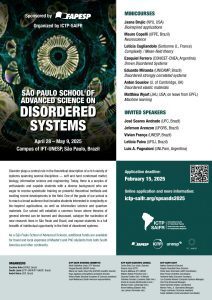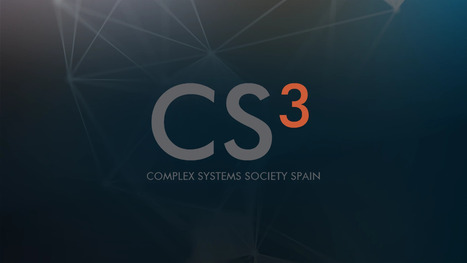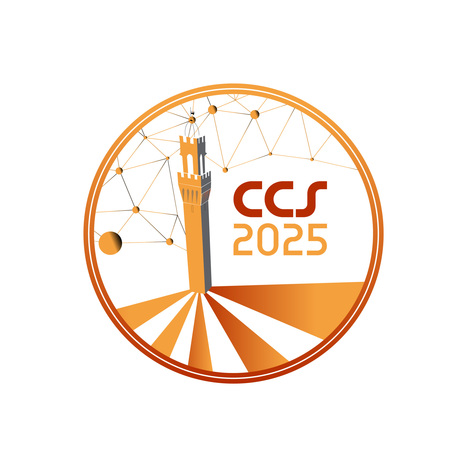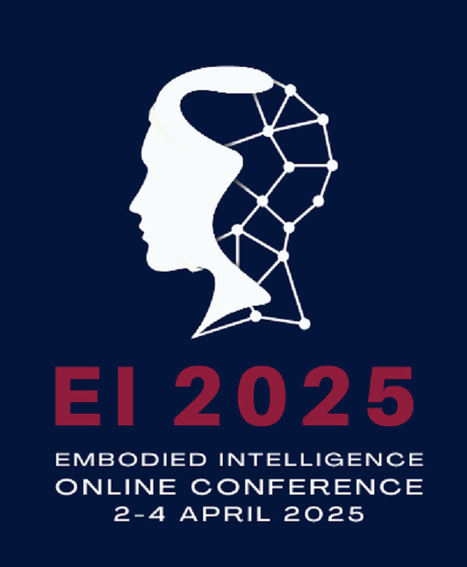 Your new post is loading...
 Your new post is loading...

|
Scooped by
Complexity Digest
September 15, 1:43 AM
|
The 2026 Conference on Complex Systems will be held in Binghamton, New York, USA. Binghamton has a long history of creativity and innovation. The Greater Binghamton area has historically been called "the Valley of Opportunity" and attracted many immigrants (especially from Europe) since the mid-1800s, which has made the region's rich and diverse culture and demographics. It is the birthplace of IBM (International Business Machines), Link Flight Simulator, McIntosh Laboratory, and a number of other pioneering ventures, fostering a spirit of ingenuity that continues to thrive. Located at the confluence of the Susquehanna river (one of the oldest rivers in the world) and the Chenango river, the region boasts stunning natural beauty and offers ample opportunities for outdoor recreation, from hiking and biking to fishing and kayaking. In particular, in mid-October when CCS 2026 is held, the Binghamton area will showcase its renowned and breathtaking fall foliage. Furthermore, a vibrant arts and culture scene flourishes here, with numerous galleries, theaters, and music venues providing enriching experiences. CCS 2026 will be held primarily in person on the main campus at Binghamton University, with an online participation option via Zoom. Read the full article at: ccs2026.github.io

|
Scooped by
Complexity Digest
August 25, 1:26 PM
|
Complexity science studies how a large collection of components can spontaneously self-organize to exhibit non-trivial, unpredictable global structures and behaviors at larger scales, having many applications with daily life impacts, e.g., climate change, financial markets, healthcare, polarization, and technological networks. Characteristics of these systems, such as having non-linear emerging dynamics and being adaptive, pose unique ethical challenges, as traditional normative ethical approaches often struggle to account for such dynamic and intricate interactions. This one-day interdisciplinary workshop aims at bridging the gap between researchers in complexity science and ethics and offers a new perspective on why ethics discussions are necessary in such a complex research realm. More at: ethics.dsi.uzh.ch

|
Scooped by
Complexity Digest
August 6, 8:35 AM
|
The aim of the school is to present methodological, computational and machine learning methods for complex networks analysis, with applications spanning a wide range of fields. The school will present a comprehensive view of the theoretical aspects of challenging topics in network theory, including higher order networks, diffusive models on networks, probabilistic and machine learning approaches, as well as computational methods. A wide range of applications will be explored during the lectures, including socio-economic and financial applications. A Python tutorial held by lecturers/teaching assistants will follow the lecture to show the implementation of the methods studied during the theoretical class and the proposed application.
More at: tcn2025.wordpress.com

|
Scooped by
Complexity Digest
June 26, 11:01 AM
|
Since its inception in 1998, ANTS has been a highly selective, single-track meeting that provided a forum for discussing advances in the field of swarm intelligence. It solicits submissions presenting significant, original research from researchers and practitioners of any area related to swarm intelligence. Swarm intelligence is an interdisciplinary and rapidly evolving field, rooted in the study of self-organizing processes in both natural and artificial systems. Researchers from disciplines ranging from ethology to statistical physics have developed models that explain collective phenomena, such as decision-making in social insect colonies and collective movements in human crowds. Swarm-inspired algorithms and methods have proven effective in solving complex optimization problems and creating multi-robot and networked systems of unparalleled resilience, adaptability and scalability. Applications of swarm intelligence continue to grow and become increasingly critical for addressing societal challenges such as environmental sustainability, food security, health, and global conflicts. The 2026 edition’s theme is "reaching beyond - swarm intelligence across systems, disciplines, and communities". The meeting seeks to encourage new perspectives, help bridge traditional boundaries and enable open debate on what could be ambitious, exploratory, and groundbreaking endeavors to embark on. More at: ants2026.org

|
Scooped by
Complexity Digest
February 25, 1:38 PM
|
ENRICO FERMI RESEARCH CENTER (Rome, Italy) 9 - 13 June 2025
A five-day Summer school on economic fitness and complexity for phd students, early career researchers, and practitioners Organised by Enrico Fermi Research Centre (CREF, Rome), UNU-MERIT (Maastricht), UNU-CRIS (Bruges) and the Young Scholar Initiative (YSI-INET) An extensive introduction to the economic complexity framework, with theoretical and practical classes, and presentations of state-of-art applications of economic complexity methods in different areas of social sciences More at: efc-school.cref.it

|
Suggested by
elennisioti@gmail.com
February 12, 6:27 AM
|
A team of researchers from the IT University of Copenhagen and Google, Zurich are bringing their love for self-organising systems to the Genetic and Evolutionary Computation Conference, a leading conference in its field that will place in July 2025 in Málaga, Spain. The workshop will feature posters from participants, invited talks and tutorials by the organisers.
Find out more about the topic and how to submit your papers at: evolving-self-organisation-workshop.github.io

|
Scooped by
Complexity Digest
January 15, 2:59 PM
|
Disorder plays a central role in the theoretical description of a rich variety of systems spanning several disciplines — soft and hard condensed matter, biology, information science and engineering. Today, there is a surplus of enthusiastic and capable students with a diverse background who are eager to receive systematic training on powerful theoretical methods and exciting recent developments in the field. One of the goals of our school is to reach a broad audience that includes students interested in complexity or bio-inspired applications, as well as information science and quantum materials. Our school will establish a common forum where theories of general interest can be learned and discussed, catalyze the nucleation of new research lines in São Paulo and Brazil, and expose students to a full breadth of intellectual opportunity in the field of disordered systems.
As a São Paulo School of Advanced Science, funds are available for travel and local expenses of Master’s and PhD students from not only South America but also from other continents. Read the full article at: www.ictp-saifr.org

|
Scooped by
Complexity Digest
January 8, 11:58 AM
|
Eager to tackle challenges related to climate change? Then apply for the Amsterdam Complexity School on Climate Change (ACSCC), which brings together early career researchers from all disciplines and non-academic stakeholders to work on projects related to climate change. The school also offers a diverse program with talks by world-renowned scientists, former members of parliament, corporate sustainability leaders, journalists, activists, and artists. ACSCC will take place at the Institute for Advanced Study from April 28 to May 2, 2025. The deadline for applications is January 26 via the ACSCC website.

|
Scooped by
Complexity Digest
November 29, 2024 1:27 PM
|
School on Origins is an interdisciplinary school that tackles the foundational questions concerning the origins of biophysical systems which include but are not limited to : molecular, cellular, neural and behavioral systems. We aim to find principles shared across systems using tools from statistical physics, mathematical analysis and numerical simulations to explore these questions. We have invited researchers that work both on the experimental and theoretical side to cover a variety of biophysical systems and theoretical approaches. The school is aimed at graduate students either at the master’s or PhD level who have a strong quantitative background and a keen interest to pursue interdisciplinary research.
We invite students pursuing degrees in physics, computer science, engineering, or mathematics. Those pursuing degrees in biology need to provide evidence of strong and extensive quantitative background in topics such as calculus, dynamical systems and numerical programming.
There is no registration fee and limited funds are available for travel and local expenses.
More at: www.ictp-saifr.org

|
Scooped by
Complexity Digest
October 29, 2024 11:41 AM
|
Keynote SpeakersRéka Albert Deepak Dhar Mirta Galesic Sarah Muldoon Alessandro Vespignani David Sloan Wilson
Important DatesFull paper submission deadline: January 24, 2025 Full paper notification to authors: February 21, 2025 Extended abstract submission deadline: February 28, 2025 Extended abstract notification to authors: March 10, 2025 Revision deadline: March 28, 2025 Registration deadline: April 7, 2025 Conference: April 9-11, 2025 More at: nerccs2025.github.io

|
Scooped by
Complexity Digest
September 19, 2024 3:45 PM
|
IC2SMA2 2025 aims to create a new international venue that can unite scholars, practitioners and students from diverse fields to address various real-world challenges and opportunities using methodologies of complex systems modeling and analysis. The conference will showcase cutting-edge modeling/analysis methods, interdisciplinary applications, and innovative solutions, fostering collaboration and sparking new ideas. Its inaugural 2025 edition will have a particular focus on the applications to education and society. By integrating insights from systems science, mathematics, computer science, engineering, economics, social sciences, psychology, healthcare, education, and many others, we seek to advance understanding and application in these crucial areas. Join us to explore how multidisciplinary approaches can drive improvements in our society! Organized in Hybrid Mode by CHRIST University, Pune Lavasa, India & Binghamton University, State University of New York, USA More at: ic2sma2-2025.christuniversity.in

|
Scooped by
Complexity Digest
September 11, 2024 12:39 PM
|
Workshop | October 28, 2024, 13h00-19h30 (GMT+1), Online
Large Language Models (LLMs) such as ChatGPT have also opened new possibilities for Human-AI interaction towards systems of co and augmented intelligence. On the other hand, developments regarding the practice of complex thinking, as a mode of coupling with the world that is organisationally coherent with the properties that organise complex natural and social systems, has been proposed as potentially leading to more effective ecosystemically positive and sustainable possibilities for action. It is hypothesised that more complex modes of thinking may lead to creative and abductive leaps capable of guiding effective interventions and the process of managing change in “real-world” complex systems, in conditions of uncertainty and risk. The CT & AI project will explore possibilities and limits of the interaction of a framework for the practice and promotion of Complex Thinking (CT) with AI tools based on LLMs (e.g. Chat GPT, Gemini). It aimed at developing and evaluating preliminary protocols to guide the integration of methods and tools for promoting CT with the use of AI tools towards generating complex understandings for practice and research. Finally, it aimed at exploring stakeholders (policy-makers, practitioners, scientists/academics) stances regarding the use of AI in relation to CT.
More at: ces.uc.pt

|
Scooped by
Complexity Digest
August 8, 2024 9:01 AM
|
Systems as different as the cellular cytoskeleton, microbial communities in soil, and savanna landscapes have in common the emergence of patterns: random yet organized spatial structures that form in an otherwise translationally invariant space. These structures emerge due to the local, individual-level interactions of agents – proteins, cells, trees – that, on a larger scale, result in nonlinear dynamics for the density field. Crucial phenomena hinge on the formation of these patterns: mitosis, embryo development, bacterial population survival, ecosystem’s robustness to aridification. While broadly different in scale, these systems can be theoretically described by similar statistical physics frameworks, an approach pioneered by Alan Turing in 1952 and still the focus of very active development. The goal of this school is to bring together experts on these different systems using mathematical modeling, experimental approaches and modern data-driven techniques to engage in an interdisciplinary dialogue about pattern formation in living systems. There is no registration fee and limited funds are available for travel and local expenses. More at: www.ictp-saifr.org
See Also: 3rd ICTP-SAIFR Symposium on Current Topics in Molecular Biophysics (CTMB3): October 7 – 9, 2024
|

|
Scooped by
Complexity Digest
September 12, 9:45 AM
|
The Spanish Society of Complex Systems (CS³ Spain) was founded in 2022, during the International Conference on Complex Systems held in Palma de Mallorca, with the aim of strengthening the community of complex systems researchers in our country. Since then, the Spanish Chapter has held three meetings: in Santander (2023), in Barcelona (2024) and in Madrid (2025), consolidating itself as a reference space for the exchange of ideas and interdisciplinary collaboration. The 4th Meeting of the Spanish Society of Complex Systems will take place in Seville, from January 21 to 23, 2026, at the emblematic Uruguay Pavilion, headquarters of the University of Seville. More at: cs3.es

|
Scooped by
Complexity Digest
August 14, 7:24 AM
|
Since 2001, the Nonlinear Science Working Group has been serving the complexity science community by organizing the Disordered Systems Symposia (DSS), one of the oldest and longest-running international events dedicated to disordered systems, complexity, and nonlinearity. DSS provides a vital platform that brings together leading specialists, early-career researchers, and participants from diverse fields to exchange ideas, foster collaboration, and advance research in complexity science. With DSS-2025, we continue two initiatives introduced to further serve and expand the community. The Murray Gell-Mann Memorial Lectures honor his pioneering contributions to complexity science and his visionary spirit. The WOMPLEXITY initiative promotes the visibility of women in complexity science. These efforts demonstrate our ongoing commitment to supporting diversity, inclusion, and excellence within the complexity science community. More at: www.non-linearscience.org

|
Scooped by
Complexity Digest
June 26, 12:15 PM
|
IC2SMA2 2026 aims to create a new international venue that can unite scholars, practitioners and students from diverse fields to address various real-world challenges and opportunities using methodologies of complex systems modeling and analysis. The conference will showcase cutting-edge modeling/analysis methods, interdisciplinary applications, and innovative solutions, fostering collaboration and sparking new ideas. Its 2026 edition will have a particular focus on the applications to education and society. By integrating insights from systems science, mathematics, computer science, engineering, economics, social sciences, psychology, healthcare, education, and many others, we seek to advance understanding and application in these crucial areas. Join us to explore how multidisciplinary approaches can drive improvements in our society!
Organized in Hybrid Mode by CHRIST University, Pune Lavasa, India & Binghamton University, State University of New York, USA More at: ic2sma2.christuniversity.in

|
Scooped by
Complexity Digest
March 23, 1:49 PM
|
The submission deadline for abstract proposals is extended by two weeks! New deadline: 05/04/2025 Join us in Siena, Italy, September 1-5. More at: ccs25.cssociety.org

|
Scooped by
Complexity Digest
February 24, 3:09 PM
|
ACM Collective Intelligence 2025 brings together a wide range of disciplines to discuss the shared or group intelligence that emerges when individuals work together, often with the help of technology. This year’s theme focuses on Diverse Intelligence. We invite research and perspectives on how we can deeply understand and build systems that incorporate animal, human, machine and hybrid intelligence to achieve a level of problem-solving capability that surpasses the abilities of any single member.
Rarely do researchers have this opportunity to interact with such a broad range of disciplines—cognitive science, philosophy, ecology, biology, computer science, anthropology, organizational science, network science, sociology, economics, business, and many others. Join us to advance our collective understanding of how to harness our collective abilities. More at: ci.acm.org

|
Scooped by
Complexity Digest
February 11, 8:32 AM
|
This FREE event brings together a wide range of speakers to discuss the many challenges and opportunities in Embodied Intelligence research! The conference is structured with a morning session and afternoon session each day to accommodate different time zones. Each session includes plenary talks, panel discussions (including flash talks by leading researchers), and breakout sessions as shown in the tentative programme. While plenary and panel speakers are invitation-only, we solicit wider contributions in breakout sessions to facilitate more focused and technical discussions. In addition to traditional conference talks for all prominent and young academics, this year we will be running masterclasses when all participants can come and talk to leading researcher in all fields of Robotic exploration. More at: embodied-intelligence.org

|
Scooped by
Complexity Digest
January 13, 5:58 PM
|
The National Autonomous University of Mexico, via its Research Group on Philosophy of Computing, is proud to invite you to participate in the International Conference on Anticipatory Systems and Rosennean Complexity. Inaugurated by Dr. Robert Rosen, Anticipatory Systems Theory deals with how systems with the ability to anticipate model and act on future states. This conference aims to address anticipation in its many forms, including its philosophical, biological, cognitive, and technological dimensions. This year (2025) will also mark the 40th anniversary of the original publication of Rosen’s “Anticipatory Systems: Philosophical, Mathematical, and Methodological Foundations”, an occasion that we shall celebrate in our conference. This conference is focused on Robert Rosen’s ideary and notions of life, complexity, modeling, and mind. More at: anticipation.philcomp.org

|
Scooped by
Complexity Digest
December 18, 2024 8:08 AM
|
The re-emergence of Machine Learning (ML) in the last decade has started to revolutionize the way we think about science, technology, and even our everyday lives. ML has rapidly become a significant part of research across all scientific areas, including the physical sciences. This school attempts to capture the recent excitement about ML in general and for biophysical and biomolecular systems in particular, addressing participants with various backgrounds ranging from biology or biotechnology to physics. The school’s purpose is threefold: a) to provide a theoretical foundation from the physicists’ perspective, b) to cross-pollinate different theoretical, experimental, and computational approaches, and c) to develop an overarching perspective that would tie together the various phenomena from biomolecular simulation and electrostatic interactions on the molecular scale to collective behavior of macroscopic biological entities in a unified approach within an ML framework. There is no registration fee and limited funds are available for travel and local expenses. This school will be preceded by the II Brazilian Workshop on Soft Matter from April 7-11. More at: www.ictp-saifr.org

|
Scooped by
Complexity Digest
November 29, 2024 11:26 AM
|
Through minicourses and research seminars and discussion sessions, this school and workshop will explore the fundamental physical principles that govern living systems across scales, from macromolecules to birds. Minicourse topics during the school will include:
Molecular and Cell Biophysics
Neurophysics
Dynamical Systems and Collective Motion
Machine Learning Tools for Biological Physics
The school is designed for graduate students interested in the intersection of physics and life sciences from a physics perspective. Leading experts will deliver in-depth lectures on cutting-edge experiments, theoretical frameworks, and emerging trends in the field.
Immediately following the school there will be a 3-day workshop with invited seminars by researchers from Latin America, as well as discussion sessions addressing how to build a network of biological physicists in the region.
Applicants are invited to submit abstracts for poster presentations during both the school and workshop.
There is no registration fee. Limited funding is available to support travel and local expenses for school participants and local expenses for workshop participants. More at: www.ictp-saifr.org

|
Scooped by
Complexity Digest
October 4, 2024 5:51 PM
|
February 19-21, 2025. Puerta de Toledo Campus, Carlos III University of Madrid
During the 2022 International Conference on Complex Systems held in Palma de Mallorca, the Complex Systems Society approved the creation of its Spanish Chapter .
The main objective of the Spanish Chapter is to bring together researchers in complex systems and other areas of potential interaction at an annual meeting held somewhere in Spain. The Chapter has held two meetings, the first in Santander in May 2023 and the second in Barcelona in February 2024 .
This 3rd meeting will take the form of a two-day workshop, starting on Wednesday, February 19 at 3:30 p.m. and ending on Friday, February 21 at 2 p.m. There will be approximately 5 invited talks (30 minutes each) and several contributed talks (15-20 minutes), plus a poster session.
Read the full article at: cs3.es

|
Scooped by
Complexity Digest
September 18, 2024 10:33 AM
|
The Winter Workshop on Complex Systems is a one-week workshop where young researchers worldwide come together to work on interdisciplinary projects around complex systems.
The primary focus of the workshop is for participants to engage into novel research projects.
This is the 10th edition of the WWCS and it will be held in Rifugio Madonna delle Nevi (Lombardy, Italy) from the 26th to the 31st of January 2025. More at: wwcs2025.github.io

|
Scooped by
Complexity Digest
September 11, 2024 10:42 AM
|
October 28 – November 1, 2024 São Paulo, Brazil ICTP-SAIFR/IFT-UNESP
We will present five 3-hour lectures that will introduce participants to the world of Bayesian Machine Learning for scientific purposes. The minicourse is tailored to suit both senior and junior researchers, catering to their respective levels of experience and interest.
In the first block of each lecture, we aim to transmit the big picture of the lecture’s topic with a focus on the details from a supervising point of view. The fine points and subtleties will be addressed here, but without strict demonstrations or supplied code. This block is intended for both seniors and juniors: for seniors as a summary that shows how to apply these tools to scientific research; and for juniors as an entrance to the second block in which we put our hands in the dough. We conclude the block with an extended coffee break where we expect that the proposed ideas trigger discussions around each participant’s field of study and how to apply it in their data.
The second block is very hands-on and is intended for juniors, but seniors interested in getting actively involved in the calculations are welcome as well. We present, discuss and write code. Participants are engaged in coding exercises and discussing practical applications. This block emphasizes practical skills and real-world problem-solving. We use different libraries, and we deploy statistical software especially designed to tackle the presented problems
The minicourse is generally designed for any scientific career. We use mostly physics examples, but the material will be useful and insightful for any other field with hard scientific research. We will try to adapt and discuss the problems within the participants’ fields of research.
Participants are expected to have taken courses in algebra and analysis, be familiar with multi-dimensional vectors and expressions, have some knowledge of probability and statistics, and be prepared for non-trivial abstract reasoning and thinking. Juniors, in addition, are expected to have some knowledge of Python.
There is no registration fee and limited funds are available for local expenses.
Lecturer:
Ezequiel Alvarez (ICAS-UNSAM, Argentina)
Organizer:
Rogério Rosenfeld (IFT-UNESP/ICTP-SAIFR, Brazil)
Apply at: www.ictp-saifr.org
|






 Your new post is loading...
Your new post is loading...





















